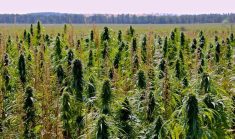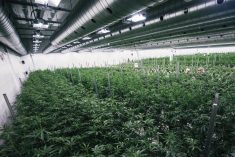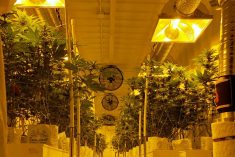Winnipeg | Reuters — Some Canadian flower growers are turning to weed, with the country’s plan to legalize marijuana for recreational use expected to spur a spike in legal sales of the drug.
While medical marijuana is already legal in Canada, the Liberal government said in April it will introduce a law in 2017 to support expanded legalization, a policy already backed by several U.S. states.
Canadian legal marijuana sales may climb to $4.6 billion by 2019 from just $125 million, according to PI Financial.
The potential demand spurred Jeannette VanderMarel and Scott Skinner, experienced in growing lavender, to plant their first marijuana crop in September.
Read Also

Pea, lentil outlooks have some positive signals – Penner
As pulse growers consider what to plant this spring, Chuck Penner of Leftfield Commodities Research said there is some optimism in the Canadian pulse market. Penner gave a presentation at the Saskatchewan Pulse Growers meeting in Swift Current on Feb. 4.
The slogan on their Hamilton farm, called The Green Organic Dutchman, is “We’re Farmers not Pharma.”
“There might have been a perception that it’s huge corporate entities entering this market. We are truly a mom and pop farm,” VanderMarel said.
Even so, Dutchman aims to go public next year and produce 13,000 kg by 2018.
Dutchman’s growing facility looks like a farm shed from the outside, but is more pharmaceutical plant inside, where workers wear face masks, shoe covers and gloves, and a microbiologist works full-time.
Prime Minister Justin Trudeau has said the goal of legalization is to take revenue from organized crime and better protect young people.
The policy change will create 2018 cannabis demand of 655,000 kg, Canada’s parliamentary budget officer (PBO) said. An estimated 4.6 million Canadians are expected to try cannabis in 2018, according to PBO.
Potential producers have taken notice. Health Canada was processing 422 licence applications as of Nov. 8. It has only approved 36 since 2013 when Canada allowed commercial medical marijuana production.
A government report on regulating the expanded industry was completed this week, but has not become public.
In Prince Edward Island, Canada’s Island Garden Inc. just harvested its second crop, and is aiming for capacity of 800 kg by June. President Edwin Jewell says running a farm market has been critical experience to setting up his indoor cannabis operation.
But he had worried what longtime customers might think.
“I was thinking, ‘will they take a stand that they don’t want to support me any longer?” he said.
“We haven’t seen that at all.”
Aphria Inc. produces six harvests a year in Ontario greenhouses, using its founder’s experience growing poinsettias and vegetables.
“Ninety per cent of any plant is the same — roots, stems, stalks, leaves,” said CEO Vic Neufeld.
But cannabis requires high maintenance, he added, demanding at times 12 hours of sunlight per day and 12 hours of total darkness, requiring “blackout curtains.”
Aphria and other large producers, such as Canopy Growth Corp., Mettrum Health Corp. and OrganiGram Holdings Inc., are already aggressively expanding. Canopy agreed on Thursday to buy Mettrum for $430 million in stock.
But some potential growers like Ontario-based Kuyvenhoven Greenhouses are just saying no, with capital and risks not the only deciding factors.
“I had trouble introducing something I didn’t ethically believe in,” said owner Andrew Kuyvenhoven.
— Rod Nickel is a Reuters correspondent covering the agriculture and mining sectors from Winnipeg.















